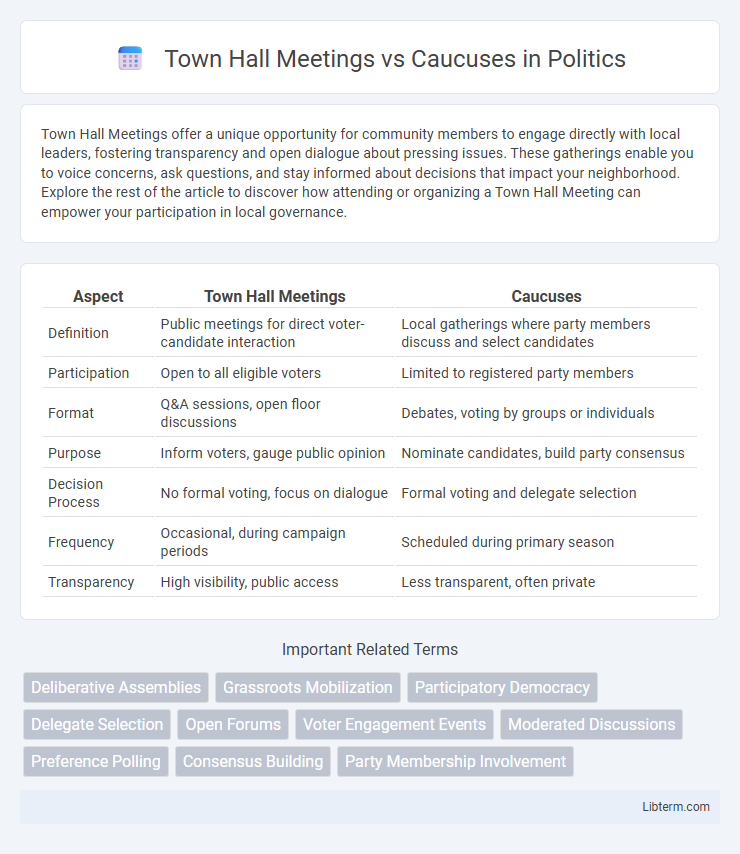Town Hall Meetings offer a unique opportunity for community members to engage directly with local leaders, fostering transparency and open dialogue about pressing issues. These gatherings enable you to voice concerns, ask questions, and stay informed about decisions that impact your neighborhood. Explore the rest of the article to discover how attending or organizing a Town Hall Meeting can empower your participation in local governance.
Table of Comparison
| Aspect | Town Hall Meetings | Caucuses |
|---|---|---|
| Definition | Public meetings for direct voter-candidate interaction | Local gatherings where party members discuss and select candidates |
| Participation | Open to all eligible voters | Limited to registered party members |
| Format | Q&A sessions, open floor discussions | Debates, voting by groups or individuals |
| Purpose | Inform voters, gauge public opinion | Nominate candidates, build party consensus |
| Decision Process | No formal voting, focus on dialogue | Formal voting and delegate selection |
| Frequency | Occasional, during campaign periods | Scheduled during primary season |
| Transparency | High visibility, public access | Less transparent, often private |
Introduction to Town Hall Meetings and Caucuses
Town Hall meetings are informal gatherings where community members discuss local issues directly with elected officials, fostering transparent communication and civic engagement. Caucuses are organized political meetings where party members select candidates or decide policy directions, emphasizing party unity and grassroots involvement. Both formats serve as essential platforms for democratic participation but differ in structure and purpose.
Historical Background of Both Systems
Town hall meetings originated in colonial New England during the 17th century as a grassroots form of direct democratic governance where community members gathered to discuss local issues. Caucuses trace back to early American political gatherings in the 18th century, serving as informal meetings of party members to select candidates and develop party platforms. Both systems have evolved to balance public participation with political organization, reflecting their distinct roles in democratic decision-making.
Structure and Format Differences
Town Hall meetings feature an open forum structure where participants engage in direct dialogue with elected officials, promoting transparent communication and immediate feedback. Caucuses operate as organized gatherings of party members who discuss and vote on candidates or policies in a more inward, deliberative format, often involving multiple rounds of discussion and alignment. The key distinction lies in the Town Hall's public, inclusive setting versus the caucus's private, participatory process with structured decision-making phases.
Participation Requirements
Town hall meetings typically allow open participation for all registered voters in a community, encouraging direct dialogue and public input without stringent eligibility criteria. Caucuses require attendees to meet specific party affiliation requirements and often demand active involvement, such as group discussions and public voting, which can limit participation to more engaged and committed members. The structured nature of caucuses contrasts with the inclusive and less formal setup of town hall meetings, affecting accessibility and voter turnout.
Inclusivity and Accessibility
Town Hall meetings offer greater inclusivity and accessibility by allowing any community member to attend, voice opinions, and engage in open dialogue, fostering diverse participation. Caucuses, by contrast, often require participants to attend scheduled gatherings in person and commit extended time, which can limit involvement to those with flexible schedules and mobility. The open format of Town Hall meetings better supports equal political engagement, while caucuses may inadvertently exclude marginalized or time-constrained individuals.
Decision-Making Processes
Town Hall Meetings enable direct citizen participation by allowing attendees to voice opinions and influence decisions in an open forum, promoting transparent and community-driven governance. Caucuses involve structured gatherings of party members who select candidates and decide policy directions through collective deliberation and consensus-building, reflecting more organized internal decision-making. Both processes enhance democratic engagement but differ in format, with Town Halls favoring broad public input and Caucuses focusing on party-aligned decision strategies.
Transparency and Accountability
Town Hall Meetings promote transparency by allowing direct interaction between constituents and elected officials, enabling real-time questioning and clear communication of policies. Caucuses, while fostering in-depth discussion among party members, often operate behind closed doors, limiting public visibility and reducing accountability. The open nature of Town Hall Meetings better supports democratic transparency and holds officials more accountable to voter concerns.
Impact on Voter Engagement
Town hall meetings foster direct voter engagement by providing a platform for open dialogue and immediate feedback between constituents and candidates, enhancing transparency and trust. Caucuses tend to engage dedicated party members through in-depth discussions and candidate endorsements, but their complexity and time commitment can limit broader participation. The interactive nature of town halls generally results in higher voter inclusivity, while caucuses emphasize mobilizing highly motivated voters.
Advantages and Disadvantages
Town hall meetings foster direct voter engagement and transparent dialogue, allowing constituents to voice concerns and receive immediate feedback, but they often lack structured decision-making and may not represent the entire electorate evenly. Caucuses offer a more organized process for selecting candidates with active participant involvement, promoting in-depth discussion and consensus, yet they can be time-consuming, less accessible for some voters, and may discourage participation due to their complexity. Both formats impact democratic participation differently, balancing inclusivity with procedural efficiency.
Which System Is More Effective?
Town hall meetings foster direct voter engagement through open dialogue and immediate feedback, making them highly effective for community-driven decision-making. Caucuses emphasize collective deliberation and party alignment, often leading to more organized but less inclusive participation. Evaluating effectiveness depends on balancing broad voter involvement in town halls against the strategic cohesion achieved in caucuses.
Town Hall Meetings Infographic

 libterm.com
libterm.com